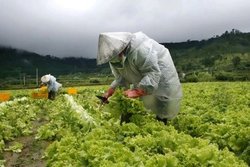
The National | Feb 22, 2011
Farah Halime
Dubai business leaders have urged the Government to snap up farmland overseas to grow basic staples as a buffer against soaring food prices.
Representative groups from the food and beverage sector, including the Food and Beverage Manufacturing Group, have approached the Dubai Chamber of Commerce to emphasise the importance of cultivating staple commodities such as rice, wheat and milk in foreign countries.
"Business leaders are thinking strategically about [buying land for cultivation across the globe] as an opportunity to deal with this challenge," said Hamad Buamin, director general of the chamber at a Gulf food industry conference on food exports in the Mena region yesterday.
Although Mr Buamin admitted the UAE was "not the best climate to produce things [and] to grow everything we want really locally", he said farming abroad makes "commercial sense and at the same time counteracts risk".
"So instead of growing wheat here, you can own a farm in the US, " he said, adding Africa, Brazil and South East Asia are seen as potential hubs for cultivation to ease food security pressures. "We know some existing business leaders already have a special relationship with different parts of the world and are having discussions [on farming land]," Mr Buamin said.
World food prices rose to a record high last month, according to the UN's closely watched food price index from the Food and Agriculture Organisation. The index, which measures the wholesale price of basic foods within a basket, averaged 231 points last month, up 3.4 per cent from December and its highest level since records began in 1990.
The higher costs of wheat, sugar and dairy products have been a major contributing factor for uprisings in Tunisia, Egypt and other Arab nations.
Higher international food prices are more noticeable in the Gulf because the region imports nearly all of its food. The UAE imports about 85 per cent of its food requirements but has already taken some action to safeguard its future needs by building food reserves.
Sultan al Mansouri, the Minister of Economy, said this month the UAE would look to invest in farmland in Turkey as rising demand and adverse weather cut harvests and pushed food prices to a record, raising the urgency of food security.
"The key motivation here is about security in terms of volatility in food price and global supply," said Abah Ofon, a soft commodities analyst at Standard Chartered Bank.
"It's not about enjoying economies of scale but if you can actually secure your supply that limits risk at any particular time."
Commodities analysts also expect governments to increase their role in global food markets. Countries across Africa and Asia are increasing imports or releasing supply from state reserves to try to cool inflation.
"In the countries with the most political instability like Morocco and Algeria, we're seeing an increase in imports to beef up stock levels," Mr Ofon said.












